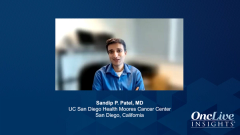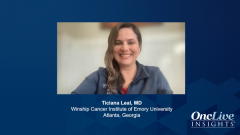
Treatment Options for EGFR-Mutated NSCLC Following Progression
Sandip P. Patel, MD, discusses treatment options available for patients with EGFR-mutated NSCLC who progress on EGFR TKIs and platinum-based chemotherapy.
Episodes in this series

This is a synopsis of an Insights series featuring Ticiana Leal, MD, of Winship Cancer Institute of Emory University, and Sandip P. Patel, MD, of UC San Diego Health Moores Cancer Center.
Associate Professor and Director of the Thoracic Medical Oncology Program at the Winship Cancer Institute of Emory University Ticiana Leal, MD and Professor of Medical Oncology at the University of California, San Diego Sandip P. Patel, MD discussed treatment options for epidermal growth factor receptor (EGFR) mutated non–small cell lung cancer (NSCLC) after progression on EGFR tyrosine kinase inhibitors (TKIs) and platinum-based chemotherapy.
Dr. Patel emphasized the importance of comprehensive biomarker testing, noting it is insufficient to just state a patient has an EGFR mutation without specifying the exact mutation like exon 19 deletion or L858R point mutation. For canonical sensitizing EGFR mutations in exons 19 and 21, next-generation sequencing of tissue or liquid biopsy is commonly used to detect targetable aberrations. Typically these patients receive osimertinib first-line based on overall survival benefit shown in FLAURA, then platinum doublet chemotherapy second-line.
Dr. Patel highlighted biomarker-guided clinical trials are key at progression, and repeat tissue biopsy should be considered over liquid biopsy to assess for small cell transformation which happens in around 15% of cases. Outside of targetable alterations, additional chemotherapy or regimens like carboplatin/paclitaxel/bevacizumab/atezolizumab may be utilized, but immunotherapy cannot be safely combined with or followed shortly after EGFR TKIs due to pneumonitis risk.
Ultimately, Dr. Patel emphasized precision oncology guided by molecular profiling is important not only at initial diagnosis but also at progression to match patients with clinical trials or targeted therapies based on emerging resistance alterations detected. Dr. Leal agreed, concluding progress has been made but resistance remains a challenge warranting further research into novel combinatorial strategies that overcome bypass pathway activation or phenotypic transformation.
*Video synopsis is AI-generated and reviewed by OncLive editorial staff.








































